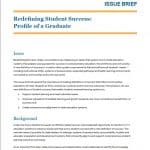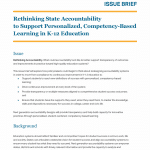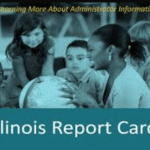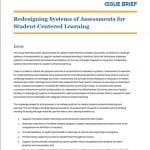States Rethinking Accountability to Support Student-Centered Learning and Innovation
Education Domain Blog
States are using a variety of approaches to innovation in accountability systems. Some are taking a broader perspective to redefine success and rethink measures and school report cards. Some are providing user-friendly tools so that parents can explore school data to find the information that matters most to them. States are also changing the systems of assessments that provide student achievement data for the accountability systems, and some states are conducting accountability innovation pilots.
 Redefining Success
Redefining Success
- Virginia is driving toward systems coherence with accountability that aligns to the Profile of a Virginia Graduate. In Redefining Student Success: Profile of a Graduate, we explain:
The Profile of a Virginia Graduate “describes the knowledge, skills, experiences and attributes that students must attain to be successful in college and/or the workforce, and to be ‘life ready’ in an economy and world characterized by rapid change.” In the Profile, a “life ready” Virginia graduate must:
- Achieve and apply appropriate academic and technical knowledge (content knowledge);
- Demonstrate productive workplace skills, qualities, and behaviors (workplace skills);
- Build connections and value interactions with others as a responsible and responsive citizen (community engagement and civic responsibility); and
- Align knowledge, skills and personal interests with career opportunities (career exploration).
Local leaders and educators in Virginia are actively engaging in systems redesign around the Profile of a Virginia Graduate. For instance, the Virginia State Board of Education proposed changes to the state graduation requirements and accountability system to align with the Profile of a Virginia Graduate. Further, under the state’s ESSA State Plan, school counselors would be trained to assist students with individualized academic and career plans that align to the vision of college and career readiness under the Profile.
Rethinking Measures and School Report Cards
- In Rethinking State Accountability to Support Personalized, Competency-Based Learning in K-12 Education, and Current to Future State: Issues and Action Steps for State Policy to Support Personalized, Competency-Based Learning
 , we described two states designing accountability systems with multiple measures reporting:
, we described two states designing accountability systems with multiple measures reporting: - California’s School Dashboard is an example of establishing a balance in state and local roles in monitoring different school performance measures. In this new system, districts will monitor four local indicators to determine if they have met, not met, or not met for two or more years. This information is gathered into a local dashboard, allowing district leaders to focus their efforts on evaluating and building school-level performance and capacity. Additionally, six state indicators make up performance categories the state monitors as common measures of student performance outcomes. This approach allows the state to monitor the progress on the six indicators as they are reported through a statewide dashboard, in order to identify schools for comprehensive and targeted support.
- Under Vermont’s ESSA State Plan, the state will include multiple measures on school performance through five state priorities: safe, healthy schools; high-quality staffing; investment priorities; academic proficiency; and personalization. These priorities are aligned to Vermont’s Education Quality Standards, a series of policy guidelines requiring all schools to provide “educational opportunities which are substantially equal in quality, ensure continuous improvement in student performance…and annually report to the community.
Providing User-Friendly Tools:
- Illinois developed a report card that, as reported by Data Quality Campaign’s report, Show Me the Data
 ,“includes detailed explanations that go above and beyond to help parents understand why that data matters to them. Typical report card definitions focus on a technical description of the data point, but Illinois includes additional context to help users understand why they should care about the information and what it might mean, more broadly, about student performance and preparation for the future.” The Illinois Report Card allows stakeholders at multiple levels, including families, policymakers, and community members, to access and find information related to school environments and student achievement.
,“includes detailed explanations that go above and beyond to help parents understand why that data matters to them. Typical report card definitions focus on a technical description of the data point, but Illinois includes additional context to help users understand why they should care about the information and what it might mean, more broadly, about student performance and preparation for the future.” The Illinois Report Card allows stakeholders at multiple levels, including families, policymakers, and community members, to access and find information related to school environments and student achievement.
Making Changes to Systems of Assessments that Provide Student Achievement Data for the Accountability Systems:
- In Redesigning Systems of Assessments for Student-Centered Learning, we highlighted how New Hampshire has develop a performance assessment system that can provide meaningful student achievement data
 for state accountability:
for state accountability:
New Hampshire has led the way in creating state policy conditions to enable richer, deeper assessment practices. New Hampshire is currently piloting the Performance Assessment for Competency Education (PACE) system. In School Year 2016-2017, eight school districts and one charter school participated in the program. New Hampshire Learning Initiative’s (NHLI) Assessments for Learning Project, No Grades, No Grades (NG2) is piloting multi-age groupings and competency-based progressions in schools.To ensure comparability of student learning determinations, PACE districts administer the Smarter Balanced assessment once in elementary school, once in middle school and the SAT in high school. In all other years, these districts administer standards-aligned, common and local performance assessments developed by the districts themselves, and validated at the state level.
- Louisiana is also developing its own innovative assessment model that will seek to combine tests for two related subjects: English and social studies. According to the state’s Innovative Assessment Pilot proposal to the U.S. Department of Education (under ESSA Sec. 1204), these tests “will include passages from books students have actually been exposed to in class, rather than brand-new material,” and students “will be asked to complete a series of brief reading and writing exams throughout the school year, to help their teachers get ‘real time’ updates on progress.” The pilot program will initially run in five districts.
Accountability Innovation Pilots
- Colorado has a pending bill – SB 204 to create “the local accountability system grant program in the department of education (department) to provide grant money to local education providers that adopt local accountability systems to supplement the state accountability system. A local accountability system may include additional measures for determining achievement of the state performance indicators and additional indicators of student success, but the measures do not affect the accreditation rating assigned to a school district or the type of plan that a school must adopt. A local education provider may use grant money to work with one or more accountability system partners, which may be public or private institutions of higher education or private nonprofit entities… A local education provider that adopts a local accountability system may submit to the department a supplemental performance report that includes information collected through the local accountability system. The local education provider may also use an alternative format for the type of performance plan that the local education provider is required to implement. The department must post the supplemental performance reports and alternatively formatted plans on the department’s data portal. Starting no later than July 15, 2020, the department must convene an annual meeting of the local education providers that implement local accountability systems to share information.”
Maria Worthen is Vice President for Federal and State Policy and Natalie Truong is Policy Director at iNACOL.